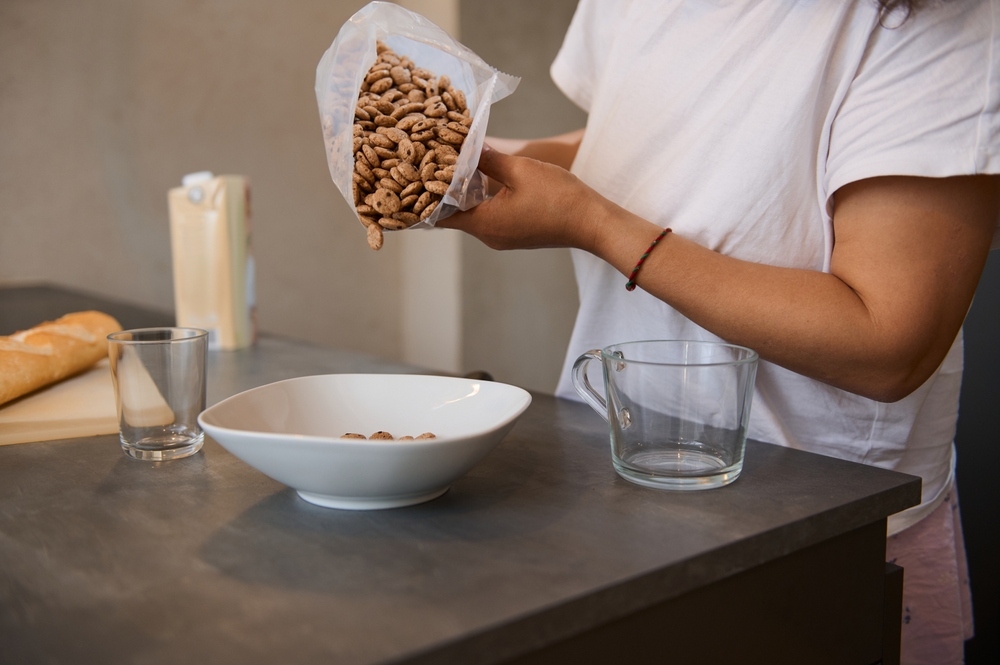Processed foods dominate modern diets, trading convenience for health concerns. While some minimally processed options remain acceptable in a balanced diet, many ultra-processed foods contain unhealthy additives, preservatives, and sugars that compromise well-being. Every trip to the grocery store confronts shoppers with aisles full of packaged foods promising quick meals and easy snacks.
Understanding which foods to avoid and their healthier alternatives can significantly impact overall health, energy levels, and long-term wellness. The challenge lies not just in identifying harmful ingredients, but in finding practical, nutritious substitutes that can satisfy cravings while supporting better health choices. By making informed decisions about processed foods, consumers can take control of their dietary habits and work toward improved well-being.
Breakfast foods and morning staples
Sugary breakfast cereals
Despite marketing claims of nutritional benefits, most commercial cereals contain refined sugars, artificial colors, and flavors. These ingredients trigger energy spikes and crashes, potentially contributing to type 2 diabetes and heart disease risks. Consider switching to plain oatmeal or muesli, enhanced with fresh fruits and nuts for natural sweetness and nutrients.
Packaged deli meats
Common sandwich meats undergo heavy processing with nitrates and preservatives, linking them to increased cancer risks and cardiovascular issues. Fresh, lean cuts of meat offer better alternatives, as do plant-based proteins like chickpeas and lentils for sandwiches and salads.
Convenience foods and quick meals
Frozen dinners
These convenient options often hide excessive sodium, unhealthy fats, and artificial preservatives behind their ease of preparation. Regular consumption may lead to high blood pressure and weight management issues. Instead, prepare and freeze homemade meals in batches for quick, healthy options.
Instant noodles
While budget-friendly and quick to prepare, instant noodles combine high sodium content with unhealthy oils and artificial enhancers. Their minimal nutritional value makes them a poor dietary choice. Whole-grain pasta or rice noodles with fresh vegetables provide more nutritious alternatives.
Snacks and beverages
Soft drinks
Regular sodas contain empty calories and high-fructose corn syrup, contributing to obesity and insulin resistance. Even diet versions raise concerns with artificial sweeteners affecting gut health. Water infused with fresh fruits offers a healthier, refreshing option.
Potato chips and snack crisps
These popular snacks deliver high sodium content and empty calories while increasing heart disease risks. Try baked vegetable chips or seasoned air-popped popcorn for healthier crunch alternatives.
Energy bars
Despite health-focused marketing, many energy bars essentially function as candy bars, packed with sugars and artificial ingredients. Create homemade versions using oats, nuts, and dried fruits, or choose whole fruits and nuts for natural energy boosts.
Dairy and prepared foods
Processed cheeses
Pre-packaged cheese products often contain more additives than dairy, alongside high sodium and saturated fat content. Natural cheeses like feta or aged cheddar, used moderately, provide better alternatives. Plant-based options suit those avoiding dairy entirely.
Store-bought baked goods
Commercial cookies, muffins, and pastries frequently contain trans fats, excessive sugars, and preservatives, raising cholesterol concerns. Home baking with whole-grain flours and natural sweeteners offers healthier alternatives.
Prepared and packaged items
Canned soups
Despite their convenience, canned soups’ high sodium content contributes to blood pressure issues and bloating. Making homemade soups with fresh ingredients allows control over sodium and eliminates preservatives.
Packaged desserts
Commercial puddings, cakes, and pies combine artificial flavors with unhealthy trans fats, increasing chronic disease risks. Homemade desserts using ingredients like coconut milk and dark chocolate provide healthier options.
Microwavable popcorn
These convenient snacks contain concerning chemicals in their packaging and artificial flavorings that may affect lung health. Stovetop or air-popped kernels with light seasoning offer safer alternatives.
Making the transition
Eliminating these processed foods requires patience and planning. Focus on gradual changes, incorporating whole foods and home preparation when possible. Over time, these adjustments can lead to noticeable improvements in energy, digestion, and overall health.
The path to better nutrition starts with conscious choices about food consumption. By recognizing harmful processed foods and choosing wholesome alternatives, individuals can take significant steps toward improved long-term health and wellness.
This story was created using AI technology.















